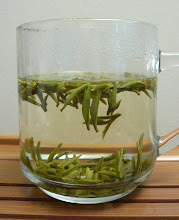(I post this on Steepster a few months ago. This is pretty much the same as the steepster post, with a few points added at the end.)
First, I have to admit that I have very limited knowledge about puerh, and I am not learning fast. I think what makes me qualified to give new puerh drinkers advice is, I am not crazy about puerh - This may sound a little illogical. But what I mean is, just because I don't have a broad love of puerh (I don't like most shu and I don't like a lot of sheng), my advice might be useful to those who don't have a broad love of puerh either. Sometimes when I recommend a puerh to someone, I would say, even I love it - if I can enjoy it, probably you can too :D
I will start with shu, because most shu tastes stinky to me. Therefore, if a shu tastes good to me, chances are most people would like it.
1. Select a shu - most of the suggestions here only make sense when the products considered have clear information about production year and manufacturer. Such information is almost essential, but more than a few products in the market don't have such information. If a product is just named "puerh" without additional production information, then there is no way to give any general advice on it.
I select shu with very conservative criteria. I look forward to expanding my horizon (mostly by getting free or cheap samples instead of making bold purchases). But I suggest beginners to use very conservative criteria in choosing puerh. Here are some criteria:
1a. I would look for shu products of about 3-years in age, or older. It's not that all younger shu products are stinky. I've had one or two new shu that are not stinky at all (which left me happily puzzled). But we are talking about being conservative here. Many products need a year or two to shed off the stinky flavor from deep fermentation.
1b. Many people believe, when you look for a shu, don't even bother with small factories, go for the large factory products. I do believe there are some very good shu products from small factories. But I agree it's a safe way to go for the large factory products first. A most conservative list of large factories would include (and their products are widely available in western market):
* Da Yi - probably the most popular factory for shu
* Xia Guan
* CNNP - It's the factory for some classic products. Unlike Da Yi and Xia Gua, CNNP does contract out a lot of their products (but not for some classics such as 7581), which is bad. But there is still the quality control, and usually when a product is bad, it's bland tasting, not of worse problems.
* This list can expand with a few more factories, but that's where debates may start. For people who have just started exploring shu, I think Da Yi products can already keep them busy for quite a while.
1c. It's probably common sense now - you don't have to buy a whole cake or tuo to experience a product. Sampling is almost essential.
2. Brewing a shu - whether gongfu style or a big teapot is used, I think following tips may help:
2a. Rinse the tea generously. Rinse the tea with boiling water for 10-15 seconds, and discard the water. If rinsing once is not enough, then twice. Some shu doesn't require rigorous rinse, but even in that case, a thorough rinse will not exhaust its flavor. When you know a specific puerh better, you will have more precise sense how much to rinse it. But at the beginning, rinsing the tea generously can reduce the off flavor of fermentation as much as possible, and therefore you can have a more pleasant first encounter with the tea. :D
2b. Start with low leaf:water ratio and increase it in future sessions if necessary. When using gongfu style, I would start with 3-4g tea in a 120ml vessel, and 5 seconds for each of the initial infusions. When using a large teapot, I would start with less amount of tea than what I would normally use for red tea, and add more boiling water whenever the teapot is less than 1/3 full. If the tea liquor looks like dark soy sauce, then probably less tea leaves or shorter infusions should have been used.
As much as I have said that I am not crazy about shu, there are indeed a few shu's that I love very much. To name just a few, there is the good old (and cheap, if home-aged) 7581. Also there is the good and popular 7262. Not only it's tasty, it also has intriguing characters in aging. According to Taiwan puerh professional Shi Kunmu, some 7262 aged in Malaysian dry storage developed into a stage resembling old sheng - I haven't experienced a shu of such characters yet, but think what he said about 7262 is quite plausible. A favorite of mine is the one in the photo of this blog, shu brick compressed with Y421, a high end loose shu produced by Kunming Factory. Y421 is a routine loose tea product, but for some reason I don't see a lot of bricks made of it in the market.
Obviously I haven't found all good shu, due to my lacking of enthusiasm in shu overall. If one is very interested in shu, I am sure there are numerous good choices. That's why I emphasize conservatism for people who newly explore shu. It's important not to be freaked out from the very beginning, and in fact there are lots of awfully freaky shu products out there.
If you by all means just dislike shu, I think that's fine. There are many other teas to enjoy anyway. One saying I somewhat disagree with (although I can understand where it's from) is, "Shu is an acquired taste." My thought is, don't bother to acquire the taste, but we can always keep ourselves open to it. If it's your cup of tea, eventually it will find its way to you. If it's not your cup of tea, then there is no obligation for you to like it, and it's ok to give it up.
六堡茶道美学煮茶
3 years ago

































3 comments:
Great post. I totally share your feelings toward Shu Puerh. I have tried a few Sheng Puerhs and I find that more to my liking, not all, but some.
I keep forcing myself to drink Puerh in hopes I will start liking it but I really dont enjoy mold in a bowl or the other earthy tastes.
Stinky or non-stinky is definitely in my vocabulary of shu, and is often the first comment I give to a shu :-p But generally speaking, Dayi's most routine shu of >3 years old should be fine.
This is interesting...I tend to not like Shu as much as Sheng, but what you said about how if you really like a Shu, others would be more likely to like it too, really resonates with me.
I also don't really agree with "Shu is an acquired taste." I had only drank Shu for the first several years of trying Pu-erh. I remembered trying my first Sheng; it was very young and I loved it. Then when I later tried older sheng, I also loved it.
Brandon of Wrong Fu Cha served me a very good Shu some time back; if only I could remember what it was. It was probably my favorite shu yet.
Post a Comment